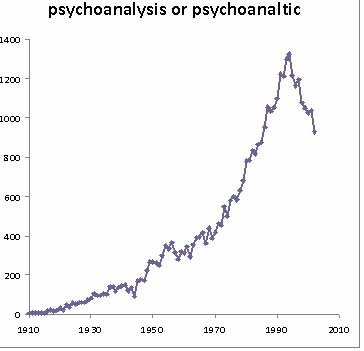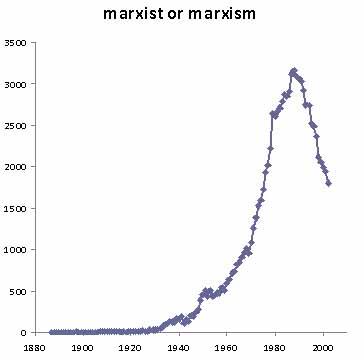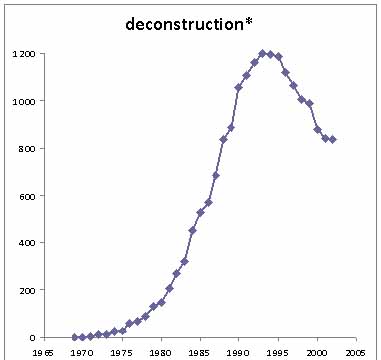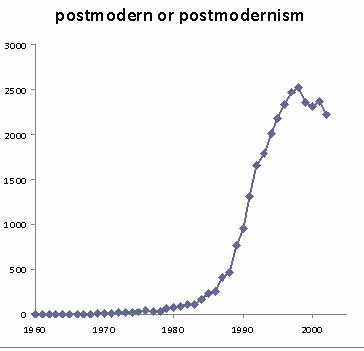I have eyes but cannot see - a wonderful post regarding academic theories
I blame it on the Percoset.
I read
American Digest every day but somehow missed
this perfect gem (link #5) until
Bird Dog at Maggie's Farm made reference to it.
The link is to
Gene Expression. The author -- agnostic -- took a look at some 'popular' academic theories and charted their number of citations at
JSTOR (Short for
Journal Storage.)
From the Wikipedia entry:
As of June 2007, the database contained 729 journal titles and over 165,000 individual journal issues, totaling over 23 million pages of text.
What follows is wonderful:




(There are six other intellectual
totems fetishes charted at Gene Expression)
Agnostic then has this to say:
Some thoughts:
First, there are two exceptions to the overall pattern of decline -- orientalism and post-colonialism. The former may be declining, but it's hard to say one way or the other. The latter, though, was holding steady in 2002, although its growth rate had clearly slowed down, so its demise seems to be only a matter of time -- by 2010 at the latest, it should show a down-turn.
Second, aside from Marxism, which peaked in 1988, and social constructionism, which declined starting in 2002 *, the others began to fall from roughly 1993 to 1998. It is astonishing that such a narrow time frame saw the fall of fashions that varied so much in when they were founded. Marxism, psychoanalysis, and feminism are very old compared to deconstruction or postmodernism, yet it was as though during the 1990s an academia-wide clean-up swept away all the bullshit, no matter how long it had been festering there.
If we wanted to model this, we would probably use an S-I-R type model for the spread of infectious diseases. But we'd have to include an exogenous shock sometime during the 1990s since it's unlikely that epidemics that had begun 100 years apart would, of their own inner workings, decline at the same time. It's as if we started to live in sparser population densities, where diseases old and new could not spread so easily, or if we wandered onto an antibiotic that cured of us diseases, some of which had plagued us for much longer than others.
Third, notice how simple most of the curves look -- few show lots of noise, or the presence of smaller-scale cycles. That's despite the vicissitudes of politics, economics, and other social changes -- hardly any of it made an impact on the world of ideas. I guess they don't call it the Ivory Tower for nothing. About the only case you could make is for McCarthyism halting the growth of Marxist ideas during most of the 1950s. The fall of the Berlin Wall does not explain why Marxism declined then -- its growth rate was already grinding to a halt for the previous decade, compared to its explosion during the 1960s and '70s.
Emphasis mine. I grew up in an academic family and could see as a child how decoupled from reality the 'soft sciences' were. No accountability, just whomever had the biggest academic dick, whomever jockeyed themselves into the position of 'top dog' won the prize.
When I moved to Boston and later to Seattle, I very much enjoyed the coffeehouse environment but could never understand what these people were talking about and they could never explain themselves to me in plain English. I wasn't 'trained' in their school of thought.
This always struck me as odd as I could explain complex scientific ideas to people if they wanted to learn.
Glad to see common sense starting to prevail...
Posted by DaveH at September 30, 2008 8:44 PM



